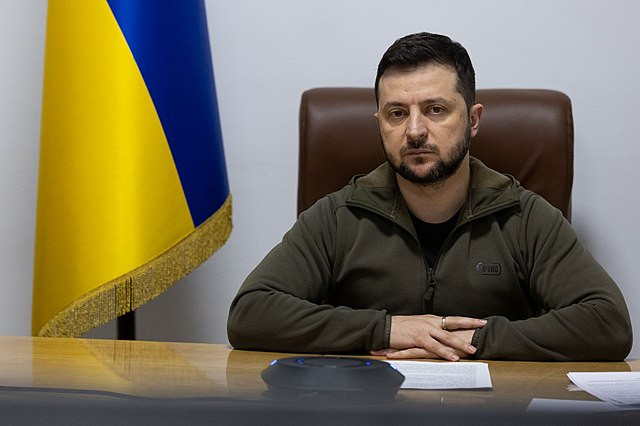A Russian missile exploded perilously close to a convoy carrying Ukrainian President Volodymyr Zelensky and Greek Prime Minister Kyriakos Mitsotakis during a deadly attack on the Black Sea port city of Odesa on Wednesday. The strike, which occurred around 11:40 a.m. Moscow time (3:40 a.m. ET), killed five people and wounded several others, according to Dmytro Pletenchuk, a spokesperson for the Ukrainian Navy.
Sources familiar with the situation reported that the group felt the impact of the strike and saw a "mushroom cloud" of smoke, with estimates putting the location of the strike between 150 meters (500 feet) and 500 meters from the convoy. Neither Zelensky nor Mitsotakis were injured in the attack.
Mitsotakis told reporters that he and Zelensky had heard air raid sirens during a tour of the war-torn city. "Shortly after, as we were getting into our cars, we heard a big explosion," he said. "I think that for us is the best, most vivid reminder that there is a real war going on here. Every day there is a war, which not only affects the front, the soldiers, it affects our innocent fellow citizens."
BREAKING:
Russia nearly kills an EU prime minister.
Zelensky & Greek PM Kyriakos Mitsotakis visited the apartment building in Odesa where a Russian suicide drone killed 12 Ukrainians
During the visit, a Russian missile struck 200m away from the 2 PMs, again killing Ukrainians pic.twitter.com/nNFn3xV2mm — Visegrád 24 (@visegrad24) March 6, 2024
Zelensky, who frequently makes high-risk trips to the front lines and has welcomed dozens of world leaders to Ukraine during the ongoing war with Russia, said he was close enough to see and hear the strike. "We saw this strike today. You can see who we are dealing with, they don't care where they strike. I know that there were victims today, I don't know all the details yet, but I know that there are dead and wounded," he said.
Former U.S. Representative Adam Kinzinger, an Illinois Republican and outspoken critic of former President Donald Trump, suggested that the strike's proximity to Mitsotakis, the leader of a NATO member state, nearly triggered Article 5 of the NATO charter. Article 5 states that an attack on any of its 31 members is considered an attack on all and would prompt a collective response.
"Russia just got within 150 meters of an article 5, with news of the strike in Odessa almost hitting the Greek Prime Minister," Kinzinger wrote on X, formerly Twitter. However, social media users noted that it was unclear whether Article 5 could be triggered by a NATO member's presence in a war zone.
The Russian Ministry of Defense claimed that its forces had launched a high-precision missile strike on a hangar in the port being used to prepare naval drones for operations, stating that the target had been achieved and the object hit. The statement did not mention Zelensky or Mitsotakis.
Odesa, which lies at the mouth of the Danube River, is crucial for Ukraine's grain exports and serves as the main base for its navy. Russia has increased drone strikes on the region in recent days, with an attack on an apartment block last weekend killing 12 people, including five children.
Zelensky emphasized the need for further strengthening the country's air defenses and urged his allies to provide more support. "The world has enough air defense systems and the ability to produce weapons for defense," he said. "Weapons are needed here to save lives. Solutions are needed now - not some day, but for the people who endure terrorist attacks every day and night."
In Washington, where U.S. President Joe Biden's $60 billion aid request for Ukraine has stalled, the White House called on House Speaker Mike Johnson to bring up a vote on the package, citing the strike as another reminder of Ukraine's urgent need for military assistance, particularly air defense interceptors.
As the war in Ukraine continues, the close call in Odesa underscores the ongoing dangers faced by the country's leadership and the potential global repercussions of the conflict. The international community remains divided on the appropriate response, with some calling for increased support for Ukraine, while others urge caution and diplomacy to prevent further escalation.




